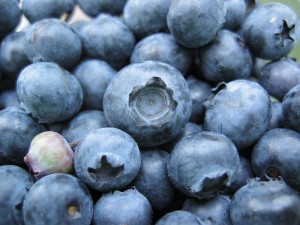By Emma Ogutu
Capital News Service
LANSING — Michigan’s agriculture food processing industry is no undersized enterprise.

Michigan ranks first nationwide in the production of blueberries. Photo: Scott Schopieray
The state’s agro-food diversity is second only to California’s and the processing unit contributes close to $25 billion to the economy each year and provides about 134,000 jobs.
But industry and agriculture experts say more can be done to improve the industry’s productivity and recently discussed how to expand.
Major challenges include infrastructure, wastewater disposal standards and transportation.
“Michigan food processors will continue to play a substantial role in our state’s reinvention by diversifying our economic base while creating long-term jobs,” said Keith Creagh, director of the Department of Agriculture and Rural Development, (MDARD). “With continued investment and policy support, there’s tremendous opportunity to expand the food processing industry in Michigan.”
At a one-day meeting in Bath key state officials discussed their commitment to the industry, said Mike DeBernardo, MDARD’s economic development specialist.
It was also an opportunity for industry representatives to discuss challenges with state officials.
“We hope to develop and strengthen our partnership with the industry and define how we’ll work together in the future,” DeBernardo said prior to the meeting.
Other agencies involved in the summit were the departments of Environmental Quality and Natural Resources.
Michigan ranks first nationwide in the production of tart cherries, blueberries, cucumbers for pickling and squash, second for carrots and celery, third for apples and ninth in potatoes. Its international exports account for $1.5 billion.
While the state has a wide range of produce processing companies, it ranks 19 nationwide and last in the Great Lakes region in total shipments within and outside the country, according to the Michigan State University Product Center for Agriculture and Natural Resources.
“We are a peninsula and so transportation is a bit difficult compared to other states that we’re competing against,” DeBernardo said. “Some of our regulations, like the tax structure, are also a bit cumbersome, making it difficult to attract investors.”
This summit was the first for Star of the West Milling Co. in Frankenmuth.
“We’re interested to know what’s going on in the food processing industry in our own state,” said Joe Cramer, vice president of the company’s edible bean division.
Cramer said that the company hasn’t faced many hindrances to expansion but would like improvements to the state’s infrastructure, for example rural electrification, to accommodate future growth efforts.
“A large part of our products moves by rail,” he said. “If there are rules and regulations that make it tougher for railroads to survive, we’d like them addressed at the summit.”
Tom Kalchik, associate director of the MSU Product Center, said that the industry is also dealing with the problems of wastewater disposal.
“This is the only barrier that has a particularly adverse effect on food processing,” Kalchik said. “Wastewater was addressed last October so there was a follow-up report at the summit. The [Department of Environmental Quality] has changed some of its procedures regarding licensing of facilities to make them more friendly to food processors … to make sure contamination doesn’t occur.”
The center found that one of the major challenges processors said is confronting them is the state’s over-regulation of waste disposal. Some industry experts suggest a reclassification of food processing byproducts as valuable raw materials rather than hazardous solid waste.
A planning committee is meeting the week of May 16 to schedule the next summit meeting, at which the industry and government hope to begin developing programs.
Carlee Schepeler contributed to this report.
Isn’t a major source of pollution in this state non-point source? And cant that be attributed to agriculture?
The food-processing industry in Michigan can play a big part in economic development, but the industry has big legacy issues with groundwater pollution, much of which has only be realized in recent years. Most of the fruit and juice processors in West Michigan, which are in rural areas where groundwater is the typical source for drinking water, are the sources of major heavy-metal contamination of aquifers.